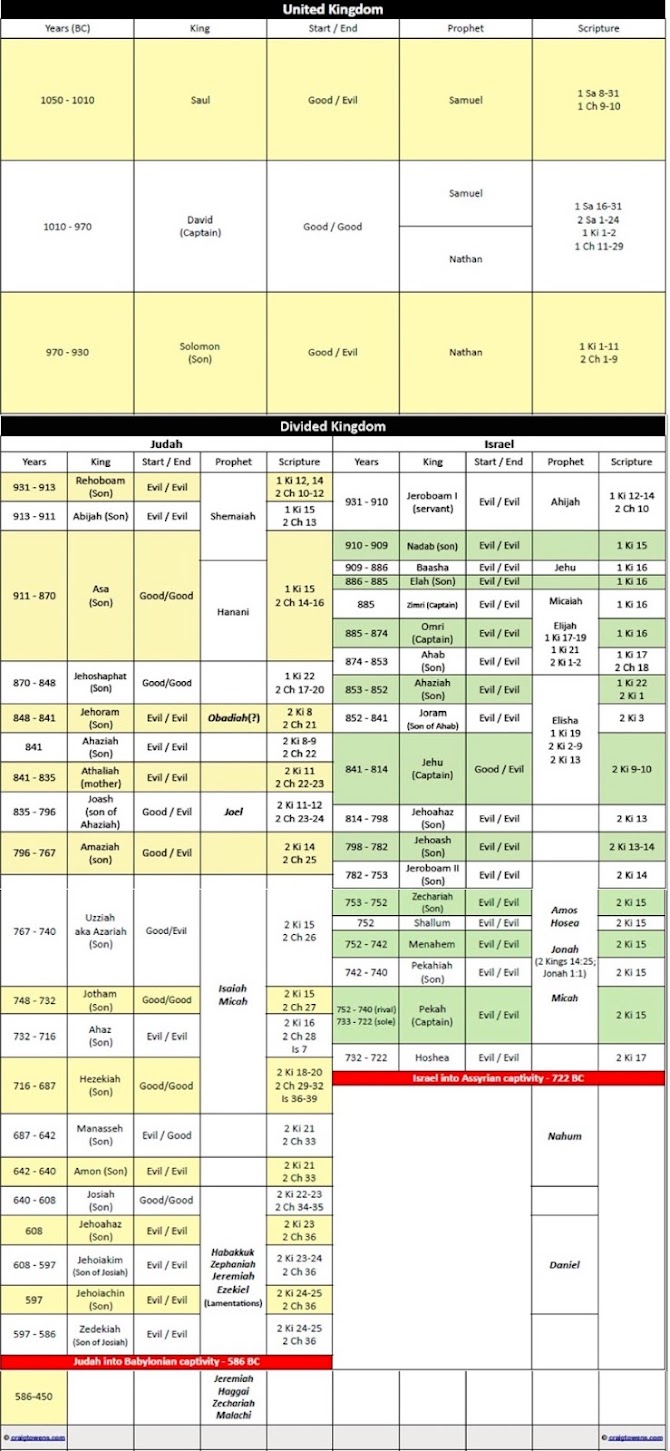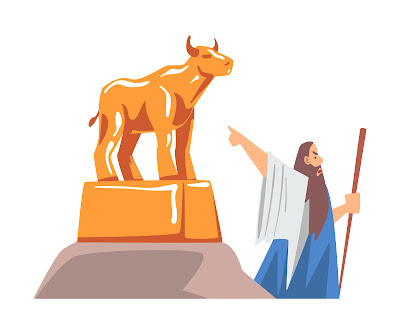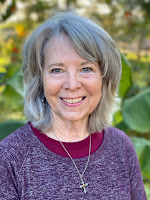When reading the Bible, biblical history, or historical novels based on Bible times, there’s sometimes confusion about the Kingdom split in 931 BC. As I researched and wrote my novel Rain, set during the time of the prophet Elijah, I struggled to understand this time period.
Mix-ups may occur because the northern kingdom retained the original name of Israel, while the southern kingdom became known as Judah. Another was that several kings (and even prophets) had the same name. Also, sometimes the north and south were bitter enemies, other times they were allies. In this post I've included some high points that removed the muddle for me.
Like the American Revolution, the rebellion that led to the separation of Israel into two separate kingdoms was precipitated by high taxation, perceived unfair treatment, and a dose of human anger.
When King Solomon died, his son Rehoboam succeeded him, and the southern tribes accepted Rehoboam’s ascendancy without incident. He then traveled north, to meet with the remaining tribes and ensure their loyalty, but matters began to unravel.
The excesses of Solomon’s reign had burdened his subjects. The northerners complained about the taxation required to build Solomon's temple and his extravagant palace at Jerusalem. They also complained about the forced labor.
King Rehoboam asked for time to consider their request. Wisely, he consulted his advisors. The elders who had served his father said:
However, Rehoboam rejected the elders’ advice and turned to the young men who had grown up with him at court. They advised the young king to say:
A gentle answer turns away wrath, but a harsh word stirs up anger.
~ Proverbs 15:1
But Jeroboam, the first king of the newly independent nation Israel, did not want his subjects going to Jerusalem to worship, potentially being influenced by Judah’s King Rehoboam. Jeroboam set up new centers of worship in the north. Disregarding Mosaic law, he chose priests not in the line of Aaron. The system lent itself to favoritism.
In opposition to the Law against creating graven images, Jeroboam set up two golden calves at Bethel and at Dan. He presented them as pedestals on which the Lord supposedly sat or stood. Jeroboam also set up minor sanctuaries on high places. Though the calves originally were supposed to represent the Lord, these places soon became centers of idol worship.
THE BEGINNING
Like the American Revolution, the rebellion that led to the separation of Israel into two separate kingdoms was precipitated by high taxation, perceived unfair treatment, and a dose of human anger.
Initially, Israel had no king. They were guided by leaders, priests, prophets, and judges who answered to God. But the nation wanted a king.
The people of Israel eventually got their wish. Israel was a united kingdom under Saul, David, and Solomon.
When King Solomon died, his son Rehoboam succeeded him, and the southern tribes accepted Rehoboam’s ascendancy without incident. He then traveled north, to meet with the remaining tribes and ensure their loyalty, but matters began to unravel.
The excesses of Solomon’s reign had burdened his subjects. The northerners complained about the taxation required to build Solomon's temple and his extravagant palace at Jerusalem. They also complained about the forced labor.
“Your father (Solomon) put a heavy yoke on us, but now lighten the harsh labor and the heavy yoke … and we will serve you.” ~ 1 Kings 12:4
King Rehoboam asked for time to consider their request. Wisely, he consulted his advisors. The elders who had served his father said:
“If today you will be a servant to these people and serve them and give them
a favorable answer, they will always be your servants.” ~ 1 Kings 12:7b
However, Rehoboam rejected the elders’ advice and turned to the young men who had grown up with him at court. They advised the young king to say:
“My father laid on you a heavy yoke; I will make it even heavier. My fatherscourged you with whips, I will scourge you with scorpions.” ~ 1 Kings 12:11
The north rebelled against this autocratic stance. Ten tribes seceded, calling for Jeroboam, a former overseer of forced labor for King Solomon, to return from Egypt and be their leader.
Jeroboam had been an up and coming young man under Solomon, until Ahijah, the prophet of Shiloh, prophesied Jeroboam would become king over ten tribes because Israel under Solomon had worshipped false gods. When Solomon learned of the prophecy, he tried to have Jeroboam killed, but the young man fled to Egypt.
Hoping to avoid impending conflict, King Rehoboam traveled north with Adoniram. He was experienced in this arena, having been the official in charge of forced labor under kings David and Solomon. However, the angry northerners stoned Adoniram to death, and King Rehoboam fled by chariot to save himself.
King Rehoboam should have listened to this advice from his father Solomon:
A gentle answer turns away wrath, but a harsh word stirs up anger.
~ Proverbs 15:1
Map of the Divided Kingdom
THE TRIBES
The northern Kingdom of Israel included ten tribes: Asher, Dan, Ephraim, Gad, Issachar, Manasseh, Naphtali, Reuben, Simeon, and Zebulun. Israel was sometimes also referred to as Samaria (after its capital) or Ephraim (after its dominant tribe.)
The southern kingdom, mostly referred to as Judah after its largest tribe, included two tribes: Judah and Benjamin. Its capital was Jerusalem.
KINGS AND PROPHETS OF THE UNITED AND DIVIDED KINGDOMS
In Israel, a king's job was to be the voice of God to the people. The Bible describes kings as good or evil, based on how well they performed this task. Sadly, because of marked idolatry perpetrated by the northern kings, none of their kings were called good. And less than half of Judah's kings lived up to the description.
Although we're discussing The Divided Kingdom, the following chart showing kings and prophets of the United Kingdom followed by those of the Divided Kingdom helps provide context.
THE TRIBES
The northern Kingdom of Israel included ten tribes: Asher, Dan, Ephraim, Gad, Issachar, Manasseh, Naphtali, Reuben, Simeon, and Zebulun. Israel was sometimes also referred to as Samaria (after its capital) or Ephraim (after its dominant tribe.) |
| @CraigTOwens via BibleGateway.com |
WORSHIP
Early on, kings made changes to worship practices and locations, especially in the north. In Judah, the only valid place for worship was the temple in Jerusalem, and all ordained priests were in the line of Aaron.But Jeroboam, the first king of the newly independent nation Israel, did not want his subjects going to Jerusalem to worship, potentially being influenced by Judah’s King Rehoboam. Jeroboam set up new centers of worship in the north. Disregarding Mosaic law, he chose priests not in the line of Aaron. The system lent itself to favoritism.
In opposition to the Law against creating graven images, Jeroboam set up two golden calves at Bethel and at Dan. He presented them as pedestals on which the Lord supposedly sat or stood. Jeroboam also set up minor sanctuaries on high places. Though the calves originally were supposed to represent the Lord, these places soon became centers of idol worship.
 |
| Moses shown denouncing Israel's sin worshipping a golden calf. At Bethel and Dan, similar idols were set up. Image via DepositPhotos |
When we read the Bible, perhaps especially the Old Testament, our first reaction may be "Why did Israel make this stupid mistake?" Their mistakes, however, can be cautionary tales. Do we make similar mistakes? How might we avoid them?
For further reading:
1 Kings 11-2 Kings in any of the following:
1 Kings 11-2 Kings in any of the following:
The Archaeology Study BibleThe Jeremiah Study BibleMacArthur Bible CommentaryBibleGateway.com
Also:
MyJewishLearning.comA History of Israel by John J. Davis and John C. Whitcomb
RAIN ~ Whispers in the Wind Book 1
Aban yearns to join the priesthood of Ba'al, unlock the power of the rain god, and hear the deity's voice. But first, he must survive a perilous initiation ceremony.
When the mysterious prophet Elijah interrupts the rites, overturns the idol, and curses the land with drought, Aban must choose a side in Yahweh's war against the Ba'als - and it may cost him his life.
Dana McNeely dreamed of living in a world teeming with adventure, danger, and romance, but she had a problem—she also needed a lot of peace and quiet. She learned to visit that dream world by stepping into a book.
Inspired by the Bible stories of Elijah, Dana wondered about the widow of Zarephath and her son. Who were they? What was their life, before? How did the boy change after he died, saw the other world—and came back?
Those questions led to Dana writing RAIN, in which she built her dream world of adventure, danger, and romance. Peace and quiet, however, have remained elusive.
No stranger to drought, Dana lives in an Arizona oasis with her hubby the constant gardener, two good dogs, an antisocial cat, and migrating butterflies.
Learn more about Dana and her books at her website: DanaMcNeely.com
Inspired by the Bible stories of Elijah, Dana wondered about the widow of Zarephath and her son. Who were they? What was their life, before? How did the boy change after he died, saw the other world—and came back?
Those questions led to Dana writing RAIN, in which she built her dream world of adventure, danger, and romance. Peace and quiet, however, have remained elusive.
No stranger to drought, Dana lives in an Arizona oasis with her hubby the constant gardener, two good dogs, an antisocial cat, and migrating butterflies.
Learn more about Dana and her books at her website: DanaMcNeely.com






Thanks for sharing this post. This can indeed be confusing.
ReplyDeleteThanks for posting! Wow, that's a LOT of information!
ReplyDeleteThanks, gals! This topic was key for me when writing Rain.
ReplyDeleteGreat article! It's interesting to see it from the other side too, when in Babylon the two nations Judah and Israel are used interchangeably. Talk about confusing!
ReplyDeleteThanks for your post. I loved the book and looking forward to reading more books.
ReplyDelete